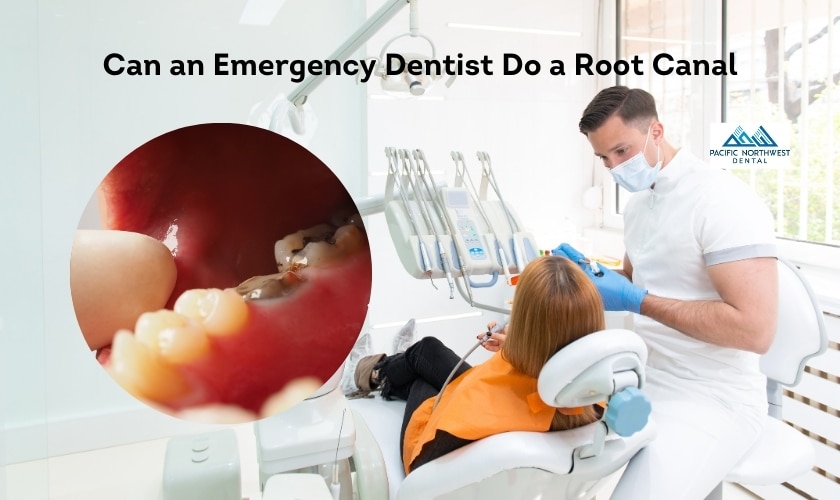
A throbbing toothache can send shivers down anyone’s spine. It disrupts your daily routine, makes concentrating difficult, and leaves you yearning for immediate relief. If you’re experiencing such an emergency, you might be wondering what your options are. Can you visit an emergency dentist for a root canal, or is that something your regular dentist handles?
The good news is that you might be able to get the urgent care you need from an emergency dentist, including a root canal procedure. This blog post will explore the world of emergency dentistry and answer all your questions about emergency dentist do root canal procedures.
When to Consider an Emergency Dentist
Let’s face it, toothaches aren’t all created equal. A minor twinge might be manageable with over-the-counter pain relievers, but a severe, persistent throb could indicate a more serious dental issue. Here are some signs that warrant a visit to an emergency dentist:
- Intense and persistent toothache: This is the most common symptom and can be a sign of an infected tooth pulp.
- Swollen gums or face: This indicates inflammation and potential infection.
- Difficulty chewing or biting: Pain while eating could suggest damage or infection in the tooth.
- Fever: A fever accompanying a toothache can be a sign of a widespread infection.
- A chipped or broken tooth: While not always an emergency, a broken tooth can expose nerves and lead to infection if not addressed promptly.
- Visible pus near the tooth: This is a clear sign of an abscessed tooth, a severe infection requiring immediate attention.
If you’re experiencing any of these symptoms, don’t hesitate to contact an emergency dentist. Early intervention can save your tooth and prevent further complications like jawbone infection.
Can an Emergency Dentist Do a Root Canal?
Yes, an emergency dentist can perform a root canal! All dentists receive training in root canal therapy during dental school. Emergency dentists are specifically equipped to handle urgent dental issues, including those requiring a root canal.
In fact, visiting an emergency dentist for a root canal can be advantageous in several ways:
- Immediate Care: Unlike scheduling an appointment with your regular dentist, emergency dentists offer same-day treatment, providing much-needed relief from your toothache.
- Expertise in Pain Management: Emergency dentists are skilled at pain management and can ensure you’re comfortable throughout the procedure.
- Equipped for Urgent Situations: Emergency dental clinics have the necessary tools and equipment readily available to perform a root canal efficiently.
However, it’s important to note that some complex root canal cases might require the expertise of an endodontist, a dentist specializing in the root canal and pulp therapy. In such scenarios, the emergency dentist might provide temporary pain relief and refer you to an endodontist for further treatment.
Understanding the Root Canal Procedure
A root canal is a dental procedure that removes infected or inflamed tissue (pulp) from the inside of the tooth. The pulp contains nerves and blood vessels, and when infected, it can cause significant pain and discomfort.
Here’s a simplified breakdown of the root canal procedure performed by an emergency dentist:
- X-ray and Anesthesia: The dentist will first take an X-ray to assess the extent of the infection. Local anesthesia is then administered to numb the area around the tooth.
- Accessing the Pulp: The dentist creates a small opening in the tooth’s crown to access the infected pulp.
- Removing the Pulp: Using specialized instruments, the dentist carefully removes the infected pulp tissue and cleans the root canal system.
- Filling and Sealing: The cleaned canal is then filled with a special material to prevent further infection. The dentist will then place a temporary or permanent crown to restore the tooth’s structure and function.
While root canals aren’t the most pleasant experience, they are often the only way to save a severely infected tooth and prevent further complications.
Recovery After an Emergency Root Canal
Following your emergency root canal procedure, the dentist will provide specific instructions on caring for your tooth. Generally, these include:
- Pain Management: Over-the-counter pain relievers might be recommended to manage any discomfort after the procedure.
- Oral Hygiene: Maintaining good oral hygiene practices like brushing and flossing is crucial to prevent further infections.
- Dietary Restrictions: You might be advised to avoid hard or chewy foods until the permanent crown is placed.
Advantages and Disadvantages of Emergency Root Canals
While emergency root canals offer a solution for immediate toothaches, it’s important to weigh the pros and cons before making a decision.
Advantages:
- Immediate Pain Relief: The most significant benefit is the swift elimination of the excruciating toothache.
- Saves the Tooth: Root canals preserve your natural tooth structure, preventing tooth extraction and the need for replacements like implants or bridges.
- Prevents Infection Spread: Early intervention with a root canal helps prevent infection from spreading to surrounding teeth and jawbone.
- Convenience: Emergency dental clinics offer flexible hours and can accommodate urgent needs outside of regular dental office hours.
Disadvantages:
- Cost: Emergency dental services typically have higher fees compared to regular dental procedures. Check with your dental insurance provider to understand your coverage for emergency procedures.
- Temporary Solutions: The temporary crown placed by the emergency dentist might need replacement with a permanent crown later by your regular dentist.
- Complexity: Certain complex root canal cases might require referral to an endodontist, leading to additional appointments and potentially higher costs.
Conclusion
A throbbing toothache is a dental emergency that shouldn’t be ignored. If you’re experiencing severe tooth pain and require immediate attention, an emergency dentist can be your lifeline. They are qualified to perform root canals, offering much-needed pain relief and potentially saving your tooth.
Remember, early intervention is crucial. While an emergency dentist in Beaverton can address your urgent needs, scheduling regular dental checkups and maintaining good oral hygiene practices are the best ways to prevent dental emergencies in the first place.
